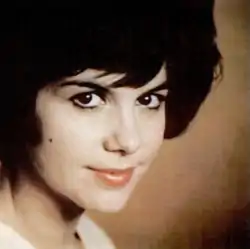Jody Miller
Jody Miller (born November 29, 1941) is an American country music singer. Born Myrna Joy Miller,[1] in Phoenix, Arizona, she was raised in Blanchard, Oklahoma, the youngest of five sisters.
Jody Miller | |
|---|---|
 Jody Miller in 1965 | |
| Background information | |
| Birth name | Myrna Joy Miller |
| Born | November 29, 1941 Phoenix, Arizona, U.S. |
| Origin | Blanchard, Oklahoma, U.S. |
| Genres | Country |
| Occupation(s) | Singer |
| Instruments | Vocals |
| Years active | 1960–present |
| Labels | Capitol, Epic |
| Associated acts | Roger Miller |
| Website | The Official Jody Miller site |
Career
Discovered by actor Dale Robertson, Miller began her career in the early 1960s as a folk/pop singer, singing in the Los Angeles area and appearing on Tom Paxton's television series. She released her first album on Capitol Records in 1964 and had a modest pop hit that year with "He Walks Like a Man" in the US but a big hit in Australia, reaching No. 8 on the national charts.
In 1965, she participated in the Sanremo Festival as a team companion of Pino Donaggio. Since the Festival was created as a composers' competition, Miller and Donaggio presented differently arranged versions of the entry "Io Che Non Vivo (Senza Te)". The song came in at # 7 and was only a moderate hit until Dusty Springfield recorded an English version in 1966 which was eventually released as "You Don't Have to Say You Love Me". Also in 1965, Jody Miller released an answer record to Roger Miller's (no relation) blockbuster hit "King of the Road", titled "Queen of the House" (which became her signature hit, peaking at number 12 on the Billboard Hot 100 and at number 5 on the country singles chart). Miller won the Grammy award for Best Female Country Vocal Performance for the song in 1966.[2]
Miller scored a second top 40 pop hit that year with "Home of the Brave", a No. 25 Hot 100 hit that was historically significant for tackling the issue of noncomformity and tolerance. The theme prevented it from making headway in the more socially conservative country charts of 1965. By the mid-1960s, Miller became a pioneer crossover female vocalist, opening the doors for Linda Ronstadt, Anne Murray, and Olivia Newton-John, and others as a pop singer recording a strong country influence and finding success in both genres. Miller's pop success petered out by the late 1960s. Tammy Wynette's record producer, Billy Sherrill, was a fan of Miller. He signed her to Epic Records in 1970 to record specifically for the country market. She had two country hits right off the bat in 1970 with "Look At Mine" nearly making the Top 20 and a Top 20 hit with "If You Think I Love You Now (I Just Started)" in early 1971. She recorded a remake of the Chiffons 1963 hit "He's So Fine", which hit the top 5 on the country chart and No. 53 on the pop chart that summer, garnering another Grammy award nomination.
Several major country hits followed, many of them remakes of pop/rock classics such as "Baby I'm Yours," "Be My Baby," and "To Know Him is to Love Him". Among the new country songs she had hits with were the top tens "There's a Party Goin' On," "Good News," and "Darling, You Can Always Come Back Home." She also continued to have hits with cover versions of pop hits like "House of the Rising Sun", a hit for The Animals, "Reflections" (different from the Diana Ross and the Supremes hit), and "(You Make Me Feel Like) A Natural Woman", an Aretha Franklin hit. Miller's last top 30 country hit was 1977's "When the New Wears Off Our Love" and two years later she made her final chart appearance.
She went into semi-retirement in the 1980s, at which time she and her husband, Monty Brooks, owned a ranch in Oklahoma but later emerged as a Christian music artist, releasing several albums. In 1999, the Country Gospel Music Association inducted Miller into its Hall of Fame, along with Loretta Lynn, Barbara Mandrell, Andy Griffith, David L. Cook and Lulu Roman. Jody and her daughter Robin recorded and toured together for a period of time. Miller continues to perform live and sings her secular hits as well as her gospel material.
Discography
References
- "MusicMatch guide, "Jody Miller"".
- "8th Annual Grammy Awards". CMT. Retrieved October 5, 2016.
External links
- The Official Jody Miller website
- Jody Miller website
- Jody Miller music
- Allmusic
- "In the Spotlight with Jody Miller" hosted by Jennifer McMullen. A one-hour monthly internet radio program streaming worldwide, devoted to the music of Jody Miller: 3:00 - 4:00pm NYT, with rebroadcasts as per the program schedule.